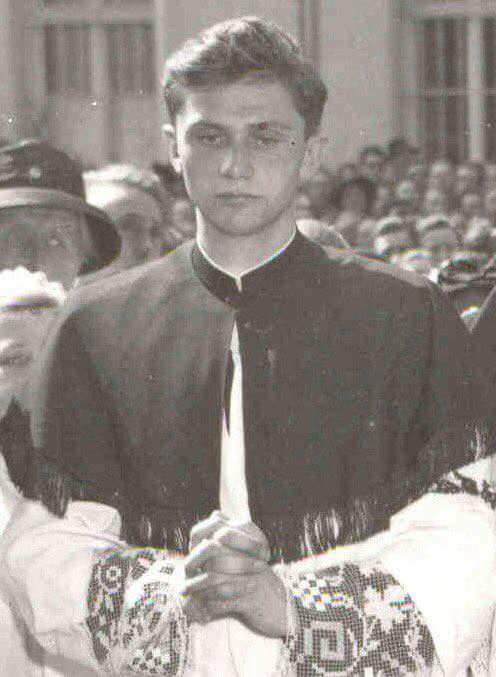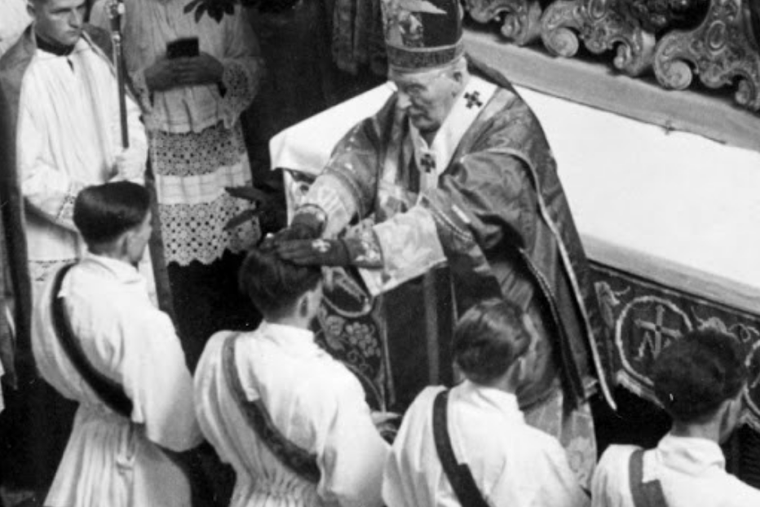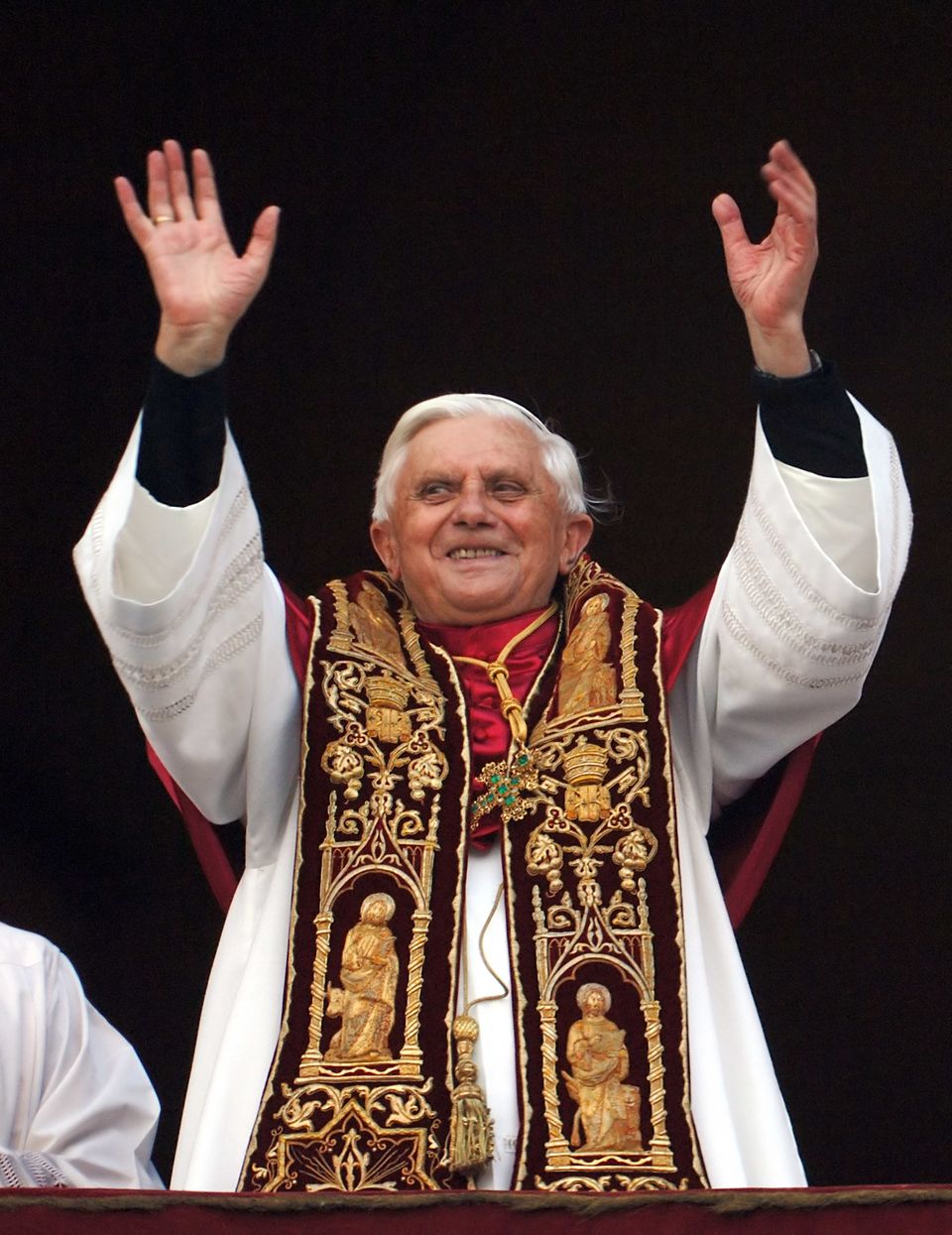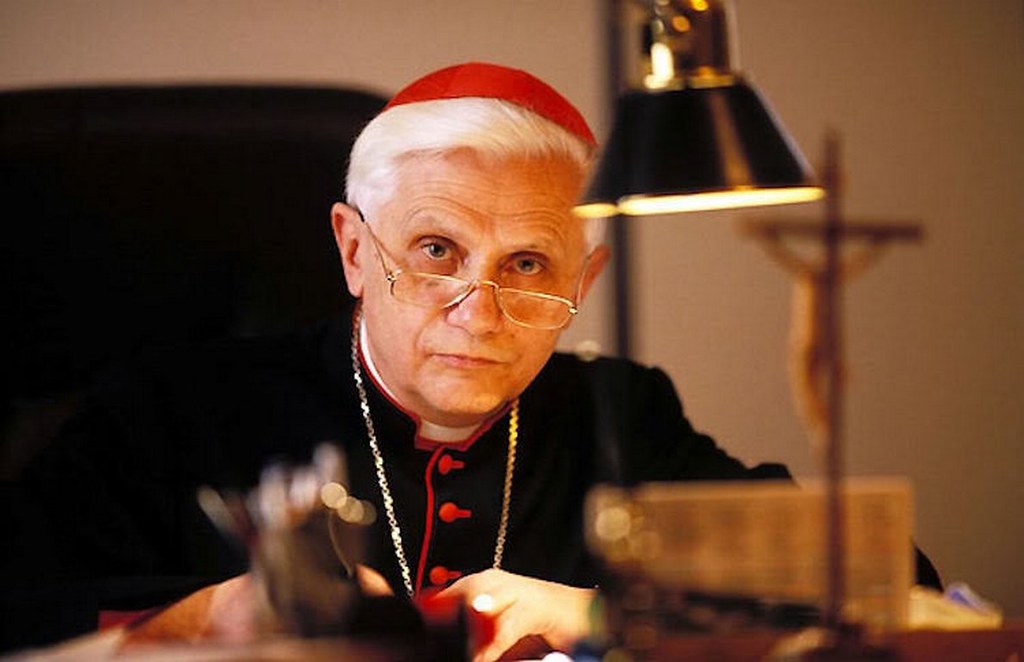Saints
Biography of Pope Benedict XVI
Pope Benedict XVI’s Family
 Pope Benedict XVI, was born as Joseph Aloisius Ratzinger on April 16, 1927, in Marktl am Inn, Bavaria, Germany. His father, Joseph Ratzinger Sr., was a police officer, and his mother, Maria Ratzinger, was a housekeeper. Pope Benedict XVI was the oldest of three children. He had a younger brother, Georg, and a younger sister, Maria. Georg Ratzinger was also a Catholic priest and served as a choir director in the city of Regensburg, Germany. He passed away in 2020 at the age of 96.
Pope Benedict XVI, was born as Joseph Aloisius Ratzinger on April 16, 1927, in Marktl am Inn, Bavaria, Germany. His father, Joseph Ratzinger Sr., was a police officer, and his mother, Maria Ratzinger, was a housekeeper. Pope Benedict XVI was the oldest of three children. He had a younger brother, Georg, and a younger sister, Maria. Georg Ratzinger was also a Catholic priest and served as a choir director in the city of Regensburg, Germany. He passed away in 2020 at the age of 96.
Pope Benedict XVI’s Childhood
As a child, Ratzinger was deeply interested in music and played the violin, piano, and organ. He also enjoyed reading and was known for his love of literature and the arts. Despite his love of the arts, Ratzinger was also a diligent student and excelled academically, particularly in the subjects of math and science.
Ratzinger grew up in a devout Catholic household and was active in his local church. He received his first Holy Communion at the age of eight and was confirmed in the Catholic faith at the age of 14.
In 1939, when Ratzinger was just 12 years old, World War II broke out and had a profound impact on his life and the life of his family. His father was drafted into the German military, and the family was forced to evacuate their home due to Allied bombing.
Despite the challenges of war, Ratzinger continued to excel academically and was accepted into the seminary in 1943, at the age of 16.
Pope Benedict XVI’s Ordination
 Pope Benedict XVI, was ordained a priest in 1951, after completing his studies at the University of Munich and the University of Freising.
Pope Benedict XVI, was ordained a priest in 1951, after completing his studies at the University of Munich and the University of Freising.
Before his ordination, Ratzinger spent 8 years in seminary, where he studied theology and philosophy and prepared for a life of service in the Church. Despite the challenges of the time, including the aftermath of World War II and the rebuilding of the Church in Germany, Ratzinger was deeply committed to his studies and excelled academically.
Ratzinger was ordained a priest on June 29, 1951, at the age of 24. The ordination took place at St. Michael’s Church in Traunstein, Germany, and was performed by Bishop Joseph Schneider. Ratzinger’s parents, Joseph and Maria Ratzinger, were in attendance at the ordination, along with his siblings and other family members and friends.
After his ordination, Ratzinger began his ministry as a priest, serving as a chaplain at a number of institutions, including a hospital and a high school. He also taught theology at the University of Bonn and later held academic positions at the University of Tübingen and the University of Regensburg.
Pope Benedict XVI is Appointed Bishop of Munich
In 1977, Pope Paul VI appointed Ratzinger as the Archbishop of Munich and Freising, a position that made him responsible for overseeing the Catholic Church in the region. Ratzinger accepted the appointment and began his ministry as Archbishop, working to strengthen the Church in the region and to address the challenges facing the Church in the aftermath of the Second Vatican Council.
As Archbishop, Ratzinger made efforts to reach out to other faiths and to promote dialogue and understanding between different religious traditions. He also worked to promote the Catholic faith and to support the spiritual needs of the people in the region.
In addition to his pastoral duties, Ratzinger also continued to write and publish on theology and the Church. He published several books and articles during this time, and his scholarship and insights on these subjects helped to further his reputation as a leading theologian and Church leader.
Pope Benedict XVI Appointed to the College of Cardinals and the Prefect of the Congregation for the Doctrine of the Faith
On May 25, 1981, Pope John Paul II appointed Ratzinger as a cardinal, a position that recognized his significant contributions to the Church and his leadership within the Church. As a cardinal, Ratzinger served as Prefect of the Congregation for the Doctrine of the Faith, a position that made him responsible for overseeing the Church’s teaching on doctrine and faith and a senior official in the Roman Curia, the administrative apparatus of the Catholic Church.
Pope Benedict XVI was appointed by Pope John Paul II as Prefect of the Congregation for the Doctrine of the Faith from 1981 to 2005. In this role, he served as the head of the Congregation and was responsible for overseeing the Church’s teaching on doctrine and faith, and for promoting and defending the Catholic faith.
As Prefect of the Congregation for the Doctrine of the Faith, Pope Benedict XVI had a number of responsibilities and duties. He was responsible for reviewing and approving Church documents related to doctrine, such as encyclicals and other official statements from the Church. He also worked to address issues related to the Church’s teaching on faith and morals, and he played a key role in the Church’s efforts to address the challenges of the modern world.
Pope Benedict XVI is Elected Pope
 After the death of Pope John Paul II, the college of cardinals gathered to elect his successor in what is known as a Papal Conclave.
After the death of Pope John Paul II, the college of cardinals gathered to elect his successor in what is known as a Papal Conclave.
The conclave is the process by which the Catholic Church elects a new Pope. It is a gathering of cardinals, who are the highest-ranking members of the Church, and it is held in secret in the Sistine Chapel in Rome.
The conclave began with the cardinals making a vow of secrecy, and they were then locked in the chapel until they reach a decision. The cardinals were not allowed to have any contact with the outside world during the conclave, and they were not permitted to use any electronic devices or communication.
In the conclave that elected Pope Benedict XVI, the cardinals began voting on April 18, 2005. On the second day of the conclave, Ratzinger was elected Pope, and he took the name Benedict XVI. He was inaugurated as Pope on April 24, 2005, and served until his resignation in 2013.
Major Accomplishments of Pope Benedict XVI
Pope Benedict XVI, also known as Joseph Aloisius Ratzinger, served as Pope from 2005 to 2013. During his time as Pope, he accomplished a number of significant things in the life of the Church. Some of his major accomplishments include:
-
Promoting the Catholic faith: Pope Benedict XVI was a strong defender of the Catholic faith, and he worked to promote the Church’s teachings and values throughout the world. He wrote numerous books and articles on theology and the Church, and he gave lectures and interviews on a wide range of topics related to the Catholic faith.
-
Fostering ecumenism: Pope Benedict XVI worked to promote ecumenism, or the unity of Christians, and he made efforts to build bridges with other faiths and denominations. He met with leaders of other faiths, and he made efforts to encourage dialogue and understanding between different religious traditions.
-
Addressing the challenges of the modern world: Pope Benedict XVI faced a number of challenges during his time as Pope, including the sexual abuse crisis in the Church, the rise of secularism and atheism, and the impact of globalization. He worked to address these challenges and to provide guidance and leadership for the Church in the modern world.
-
Strengthening the Church’s relationship with the Jewish community: Pope Benedict XVI made efforts to strengthen the Church’s relationship with the Jewish community, and he worked to build bridges of understanding and cooperation between Catholics and Jews. He made a historic visit to the synagogue in Rome, and he worked to promote dialogue and understanding between the two faiths.
-
Promoting social justice: Pope Benedict XVI was a strong advocate for social justice, and he worked to address issues such as poverty, inequality, and injustice. He wrote extensively on social justice issues and made efforts to promote the Church’s teachings on these matters.
Pope Benedict XVI’s Resignation from the Papacy
On February 11, 2013, Pope Benedict XVI announced that he would be resigning from the papacy, becoming the first Pope to do so in almost 600 years. He was the first Pope to resign since Gregory XII in 1415, and the first to do so on his own initiative since Celestine V in 1294. The announcement, which was made at a meeting of cardinals at the Vatican, came as a surprise to many Catholics and sparked widespread media coverage.
Pope Benedict XVI cited his advanced age and declining health as the reasons for his resignation. He had turned 85 years old in April 2012, and he had faced a number of health challenges in recent years, including a broken wrist, a slipped disc, and a minor stroke.
In his announcement, Pope Benedict XVI said that “after having repeatedly examined my conscience before God, I have come to the certainty that my strengths, due to an advanced age, are no longer suited to an adequate exercise of the Petrine ministry.” He added that he would continue to serve the Church in other ways, and that he would remain “hidden from the world” after his resignation.
Pope Benedict XVI’s resignation was met with sadness by many Catholics, but it was also seen as an act of humility and selflessness, as he put the needs of the Church ahead of his own.
How Pope Emeritus Benedict XVI Spent Retirement
After his resignation from the papacy in 2013, Pope Benedict XVI, retired to a monastery in the Vatican, where he lived in seclusion and dedicated himself to prayer and contemplation.
Pope Benedict XVI has largely remained out of the public eye since his retirement, but he has made a few public appearances and has continued to play a role in the life of the Church. In 2014, he made a public appearance at the canonization of Pope John XXIII and Pope John Paul II, and he has also made a few other public appearances since then.
Pope Benedict XVI has also continued to write and publish on topics related to theology and the Church. In 2016, he published “The Last Conversations,” a book of interviews with a German journalist that explored a range of topics related to the Church and the papacy. He has also published several other books and articles since his retirement.
Pope Benedict XVI has generally remained out of the public eye since his retirement, and he has not been involved in the day-to-day governance of the Church. However, he is still respected as a distinguished theologian and leader, and he continues to play a role in the life of the Church.
The Death of Pope Benedict XVI
On December 28th, 2022 Pope Francis called upon the faithful to pray for Pope Benedict XVI, who was “Very sick”
“Let us pray together for Pope Emeritus Benedict who is supporting the Church in silence. Let us ask the Lord to console him and to sustain him in this witness of love for the Church, until the end,” Pope Francis said in a tweet.
The Vatican announced on December 31, 2022 that Pope Emeritus, Benedict XVI, passed away at 9:34am on December 31, 2022 in the Mater Ecclesiae Monastery of the Vatican.
The simple funeral of Pope Emeritus Benedict XVI was held on January 5, 2022 in St. Peter’s Square, with the mass of Christian burial celebrated by Pope Francis. Pope Benedict lied in stated in St. Peter’s Basilica in the Vatican for 3 days prior to the funeral.
Popular Pope Benedict XVI Products
Patron Saints - B's
Pope Benedict XVI’s Writings
 Pope Benedict XVI, also known as Joseph Aloisius Ratzinger, was a prolific writer and scholar, and he published numerous books and articles on theology, philosophy, and the Catholic Church throughout his career. Some of his most notable writings include:
Pope Benedict XVI, also known as Joseph Aloisius Ratzinger, was a prolific writer and scholar, and he published numerous books and articles on theology, philosophy, and the Catholic Church throughout his career. Some of his most notable writings include:
- “Introduction to Christianity,” a book that provides an introduction to the Catholic faith and explores the central teachings and beliefs of the Church
- “The Spirit of the Liturgy,” a book that examines the role of liturgy in the life of the Church and the meaning of the Mass
- “Jesus of Nazareth,” a book in which Pope Benedict XVI reflects on the life and teachings of Jesus
- “Theological Highlights of Vatican II,” a collection of essays that explore the key themes and teachings of the Second Vatican Council
- “The Pope and the Church,” a book that addresses the role of the Pope in the Church and the nature of papal authority
- “The Faith: Understanding the Creed,” a book that provides a deeper understanding of the Catholic faith and the Creed
- “Dogma and Preaching,” a book that explores the relationship between doctrine and preaching in the Church
- “The Ratzinger Report,” an interview in which Pope Benedict XVI discusses his vision for the Church and the challenges facing the Church in the modern world
Pope Benedict XVI’s writings have been widely read and have had a significant impact on the Catholic Church and the broader theological community. His insights and scholarship have helped to deepen understanding of the Church and its teachings and have contributed to the ongoing dialogue and discussion within the Church.
Popular Quotes of Pope Benedict XVI
-
“The essence of faith is not to merely believe certain things, but to enter into a relationship with Jesus.”
-
“God is love, and he who abides in love abides in God, and God abides in him.”
-
“Faith and reason are like two wings on which the human spirit rises to the contemplation of truth.”
-
“The Church is not a political party, and it does not have solutions for all the world’s problems.”
-
“The first and fundamental structure for communication is the language of love, which has its own grammar and syntax.”
-
“The Church does not exist for itself, but for the world, to bring the message of the love of God to all people.”
-
“The Church’s primary task is to proclaim the message of salvation to all people, and to call them to conversion and faith in Jesus Christ.”
-
“The message of Christ is not a theory, but a proposal of love, which has the power to change our lives and the world.”
-
“Love is the most powerful force in the universe, and it has the power to conquer all things.”
-
“The Church is not a collection of perfect people, but a community of sinners who have been redeemed by the love of Jesus Christ.”
-
“The Cross is the true tree of life. It is the source of all spiritual fruitfulness.” (Homily at the Mass of the Lord’s Supper, 2008)
-
“The only way to be in a relationship with God is to be in a relationship with others.” (Deus Caritas Est, 2005)
-
“The Church must always be a place of mercy and hope, where everyone is welcomed, loved, and forgiven.” (Homily at the Mass of the Lord’s Supper, 2012)
-
“The Eucharist is the source and summit of the Christian life. It is the center of the Church’s life and mission.” (Sacramentum Caritatis, 2007)
-
“Faith is not a private affair, but a communal and public one. It is not an individualistic religion, but one that is lived in community.” (God Is Love, 2006)
-
“The truth of the Christian faith is not something that can be imposed, but rather it is something that must be freely accepted.” (Speech at Regensburg University, 2006)
-
“The Church is not a museum for preserving beautiful objects, but a living organism, called to bring the Gospel to the world.” (Homily at the Mass of the Lord’s Supper, 2012)
-
“The true measure of humanity is not in wealth or power, but in the capacity for compassion and self-giving.” (Homily at the Mass of the Lord’s Supper, 2012)
-
“The Church is not an organization that serves the interests of its members, but rather it exists to serve the needs of the world.” (Speech to the Roman Curia, 2012)
-
“To be human is to be called to love and to serve others, to be a source of hope and joy for those around us.” (Homily at the Mass of the Lord’s Supper, 2012)


